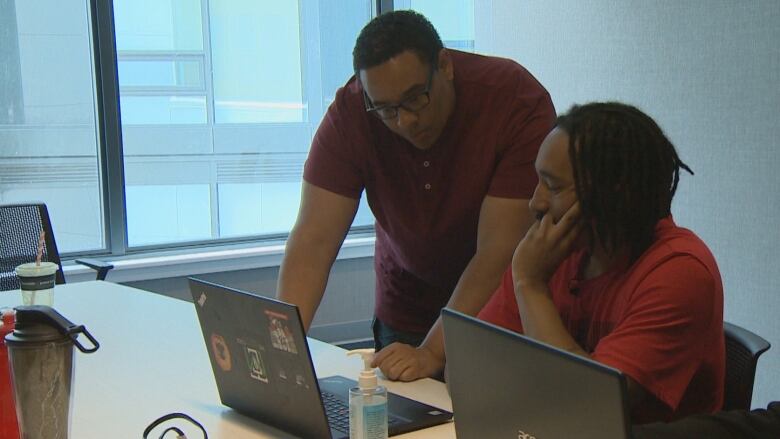Initiative seeks to help African Nova Scotians facing employment barriers
'We're talking about really changing the conversation,' says program director

A new initiative wants to provide more African Nova Scotians facing employment barriers with jobs in the tech sector.
It is being done one online lesson at a time through a coding program called the Matrix CODE.
Rodney Small, the program director, said CODE "literally stands for creating opportunities, developing everyone."
"We're literally creating opportunities that are developing everyone and not just the young people in this program," Small said.
"We're seeing where the world's going and tech is definitely an area that many of us will benefit from if we learn the language."
Theprogram was born in 2020, created in collaboration with QRA Corp, a Canadian tech company, and the African Nova Scotian Social Innovation Employment Lab.
Common goal
The founders say it was designed to bring the community, the government, non-profitsand corporations together to achieve a common goal.
In this case, the goal is to provideAfrican Nova Scotians who possess criminal records or other barriers to employment with the necessary skills to find meaningful careers.
"We're talking about really changing the conversation. We have non-violent offenders in our community that did what they had to do to survive," said Small.
"Instead of sentencing our young men to jail to further their criminal lifestyle, send them to Matrix CODE."
The one-year program takes place at the John W. Lindsay YMCA on Sackville Street in Halifax.
It involves online courses, interactive assignments where students are expected to address coding problems, as well as some classroomteaching, either online or in person.
More than the classroom
Students in the program meet daily for on average about four hours to work on assignments at the classroom at the YMCA. Students have full access to the facility.
"That's really important when we're talking about dealing with different stressors in life, so it helps us alleviate those stressors, keep our mind clear," said Small.
Alex McCallum, CEO of QRA Corp, saidthe curriculum is tough, but worth it. When students are done they're able to walk away with credentials provided by an online education company called Udacity.
Udacity offers varying programs in subjects such as programming and development, cybersecurity and artificial intelligence.
"We work with the local tech community to get them internships, so they move into a paid internship at the end and that internship lasts three to four months," said Alex McCallum, CEO of QRA Corp.
"We look at it as more of a three-or-four-month interview, and so they get a chance to go in, the company learns about them, they get to learn about the company, and, hopefully, a job comes out of it at the end."
A report released by Statistics Canada in 2020 stated that between 2001 and 2016, the Black population in Canada had consistently higher unemployment rates than the rest of the population.
'We're looking for you'
More specifically, it stated that the unemployment rate for Black men in Halifax was about two and a half times higher than the rate for men in the rest of the population of this region.
"If you face barriers to employment, and you're looking to find yourself a meaningful career, we're looking for you," said Small.
There have been about 14 graduates since the program began. Small said there has been an increase in interest lately.
While the program is open to anyone from the African Nova Scotian community, Small saida program directed toward women is being considered.
Tyler Morton is about to finish the program and head into an internship.
He saidhe turned to the program because his criminal record has stood in the way of him finding a good job, despite his intelligence.
"I am educated to the gills, but as soon as they see they do have a criminal record, a lot of places weren't hiring."
He said the programcould mean food on the table for him and his kids. He said he likes being able to learn with and teach other Black men in the community.
"I come from the mantra of 'each one, teach one', so you're only as strong as your weakest link, and having dependable people to actually help you and actually to feed off of is amazing."
Chance for better life
Tyrell Sparks does not have a criminal record, but other barriers such as being unable to finish a high school or college program have stopped him from getting work in the tech field.
He saidthe fact that he's been able to learn to code and get to the point where he'll soon be entering an internship is big for him and for his family.
Small saidhe hopes that everyone who takes the course gains confidence. He realizes that just because they may have gone down a wrong path doesn't mean they can't get on the right one.
"Just knowing as Black men that, yeah, we're more than what society has put on us and all the different stereotypes that society has put on us, and we have a lot of value to offer this world and I think that's one of the things that I'd like to see the guys take from the program."
For more stories about the experiences of Black Canadians from anti-Black racism to success stories within the Black community check out Being Black in Canada, a CBC project Black Canadians can be proud of.You can read more stories here.













_(720p).jpg)


 OFFICIAL HD MUSIC VIDEO.jpg)
.jpg)



























































































